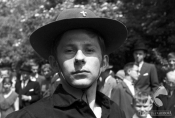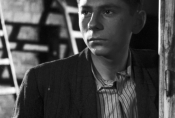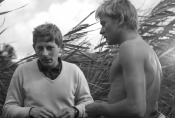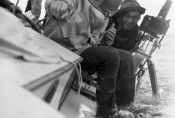Roman Polański

Film and theatre director, screenwriter, actor, producer. He was born on August 18, 1933, in Paris. When he was four years old, his family moved to Krakow. He spent most of the war in Wysoka near Wadowice, where he was hiding under the name of Roman Wilk. His artistic career began in Krakow with the radio program of Maria Biliżanka. He debuted on the stage of the Groteska Theatre in November 1949, in the performance in Cyrk Tarabumba/Tarabumba Circus. He also played the role of Żaczek in a play by Anna Świrszczyńska, and he was a real sensation as Vanya in the Son of the Regiment by Valentin Kataev.
A graduate of the Directing Department of the State Film School in Łódź (1957, diploma in 1959). Even his student films, Uśmiech zębiczny/A Toothful Smile (1957), Rozbijemy zabawę…/Break Up the Dance ... (1957), Morderstwo/A Murderer (1957), Dwaj ludzie z szafą/Two Men and a Wardrobe (1958, awards in Brussels, San Francisco, Oberhausen, Montevideo, Warsaw), Lampa/The Lamp (1959), Gdy spadają anioły/When Angels Fall (1959) – brought him recognition and festival awards. Later, he further developed his style in two short feature films: Gruby i chudy/The Fat and the Lean (1961, award in Oberhausen) and Ssaki/Mammals (1962, Golden Wawel Dragon in Krakow, awards tours and in Oberhausen). In 1961, he made his first full-length feature film, Nóż w wodzie/Knife in the Water, a bitter psychological drama about a journalist who goes with his wife to Mazury and offers a lift to a hitchhiker. The story exposes their characters flaws: the selfishness of the man, the woman’s cynicism and the affectation of the boy. His debut film earned him several prestigious awards, including at festivals in Venice, Prades, Oberhausen, Panama, as well as an Oscar nomination (he lost to Eight And A Half by Federico Fellini), as well as the fury of the communist authorities who saw the glorification of cosmopolitanism and consumer lifestyle in Polanski's work.
Recognition and awards in the world, as well as the political witch-hunt in Poland led him to decide to pursue a film career abroad: La rivière de diamants, segment of The Beautiful Swindlers, was filmed in France, Repulsion and Cul-de-sac in England, and The Fearless Vampire Killers – was an English-American co-production. His first American film was based on the novel by Ira Levin Rosemary's Baby, which brought him great acclaim and two Oscar nominations in 1969 (Oscar for Best Supporting Actress for Ruth Gordon). Six years later, Chinatown was nominated in eleven categories (it also won one Oscar for Robert Towne for Best Original Screenplay). The sex scandal in 1978 (he was accused of raping a minor) forced Polanski to leave the United States. In 2002, he was awarded an Oscar for directing The Pianist (the other winner included Adrien Brody in the title role and Ronald Harwood's screenplay adaptation). The verdict was read by Harrison Ford (who starred in his Frantic), and the room responded with a standing ovation. However, the winner did not collect the Oscar. The Pianist, filmed in Polish-German-French co-operation (2002), devoted to Władysław Szpilman, a talented musician who managed to survive the war in Nazi-occupied Warsaw, is perhaps the most honoured film by the Polish film director, as evidenced by awards such as Palme d'Or in Cannes, seven Caesars, two British Film Awards 2002, and three Oscars. His two recent films – Carnage (2011) and Venus in Furs (2013) – were filmed in co-production with the Polish film industry.
Roman Polański is also a great actor. Before he left Poland, he had many memorable roles in films directed by his colleagues from Łódź Film School, including in Pokolenie/Generation (1954) and Niewinni czarodzieje/Innocent Sorcerers (1960) by Andrzej Wajda, Koniec nocy/The End Of Night (1956) by Julian Dziedzina, Paweł Komorowski and Walentyna Uszycka, Do widzenia, do jutra…/Goodbye, till tomorrow ... (1960) by Janusz Morgenstern. Years later, he starred in Zemsta/The Revenge (2002) by Andrzej Wajda.
He was awarded the Gold Medal for Merit to Culture – Gloria Artis (2005) and an honorary doctorate of the State School of Film, Television and Theatre in Łódź (2000). He is a member of the French Academy of Fine Arts (1999) and winner of the European Film Award for Lifetime Achievement (2006), Eagle's Lifetime Achievement (2003), Platinum Lions (2011) and many other prestigious awards.
Jerzy Armata
Selected filmography
-
1961
KNIFE IN THE WATER
Articles
-
A few words about Roman Polański and his films
Ewelina Nurczyńska-Fidelska













